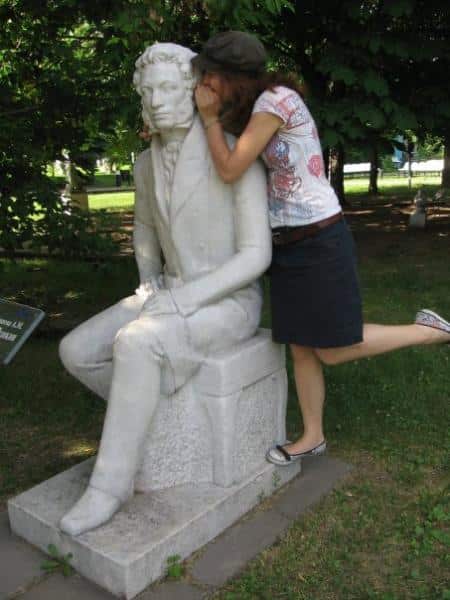
Elizabeth Geballe
PhD Candidate at Indiana University, Bloomington
When did you first develop an interest in Slavic, East European and Eurasian Studies?
As a freshman at Middlebury College in Vermont I only knew I wanted to study a language with a different alphabet. At the hectic departmental fair, I noticed that behind one table in a far corner a group of professors were laughing. I walked over and said, “It seems like you are the only ones in this whole auditorium with a sense of humor. What department is this?” It was the Russian department and I became a major on the spot. I loved indiscriminately all things Russian, and wrote on the application to study abroad that I hoped to acquire a Russian soul.
How have your interests changed since then?
Although I studied Russian literature in college, it was simply one of the many facets of the culture with which I was fascinated. It was not until graduate school that I realized that I was addicted to the Russian authors (particularly Chekhov) whom I thought I had outgrown. I applied to Comparative Literature departments expecting to slowly wean myself off Russian literature, but it has become central to my research.
What is your current research project?
I am beginning work on a dissertation that will focus on the short fiction of Lev Tolstoy, Anton Chekhov, and Katherine Mansfield. The works of these three writers span the decades that witnessed a transition into high modernism, a period that lost faith in a story’s potential to be properly told and understood. I plan to track the ways in which these works demand or resist their own distribution and circulation. Taken together, they engage in an inter-textual dialogue in which they negotiate different models of transmission. In this context, Chekov’s re-writings of Tolstoy, and Mansfield’s re-writings of Chekhov, are transmitted tales (repetitions, adaptations, translations, and plagiarisms) that expose and critique the models of transmission that precede and generate them. In other words, I will be comparing transmission as a theme in individual works with transmission as it occurs between authors and across periods and languages.
What do you value about your ASEEES membership?
I have recently begun attending the annual conferences and have found that they are far more invigorating, inspiring, and navigable than other academic conferences. Flipping through the conference handbook and getting into an elevator full of people who are all in related fields of study make me feel, once again, like a freshman who has discovered the best table at an academic fair.
Besides your professional work, what other interests and/or hobbies do you enjoy?
I am a devoted player of games of many varieties: board games (my current favorite is The Settlers of Catan), sports games (really only tennis) and party games (I dream of a conference-wide game of Mafia…)
